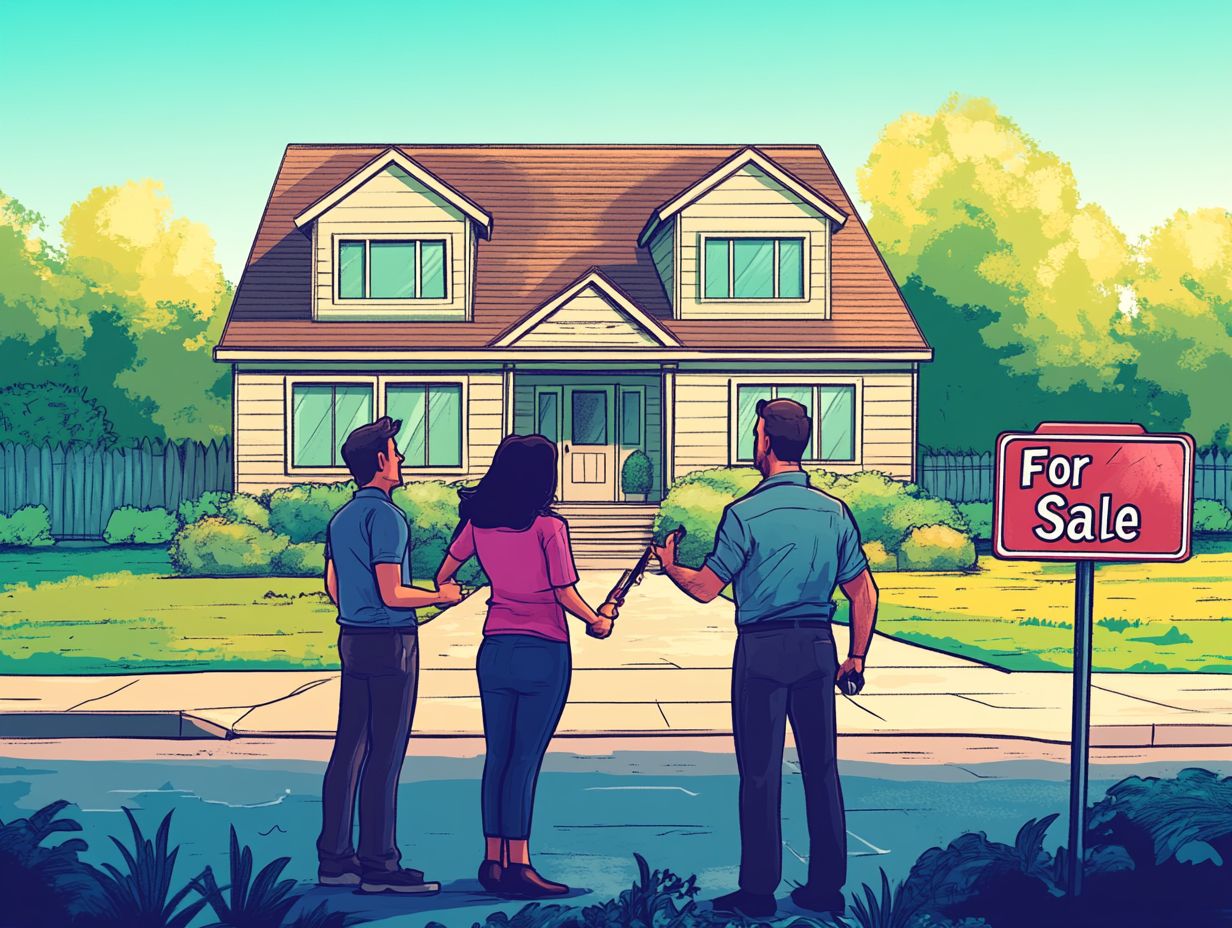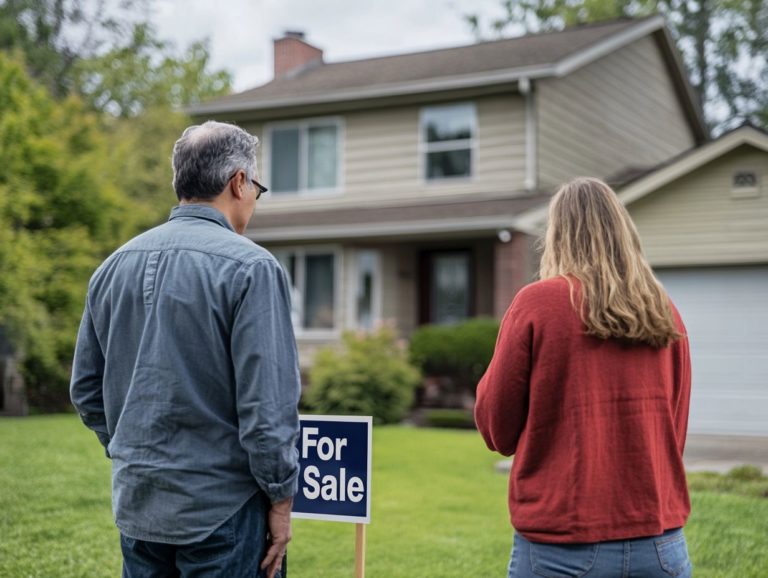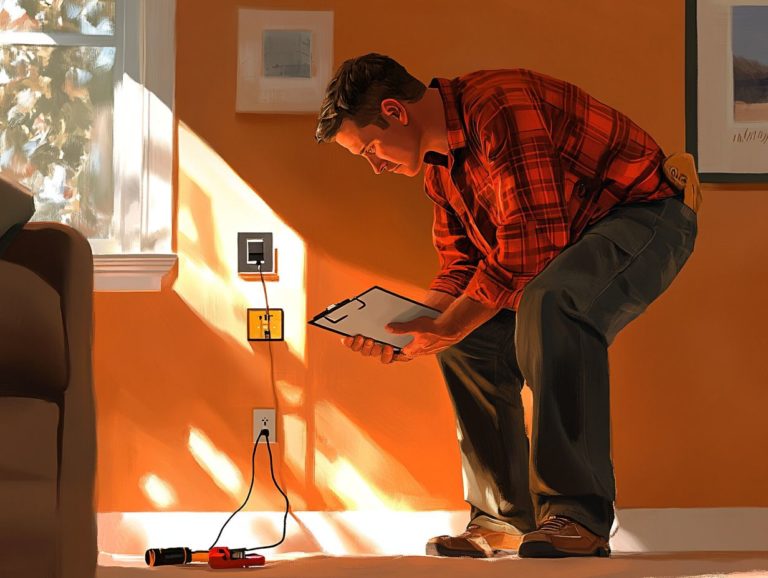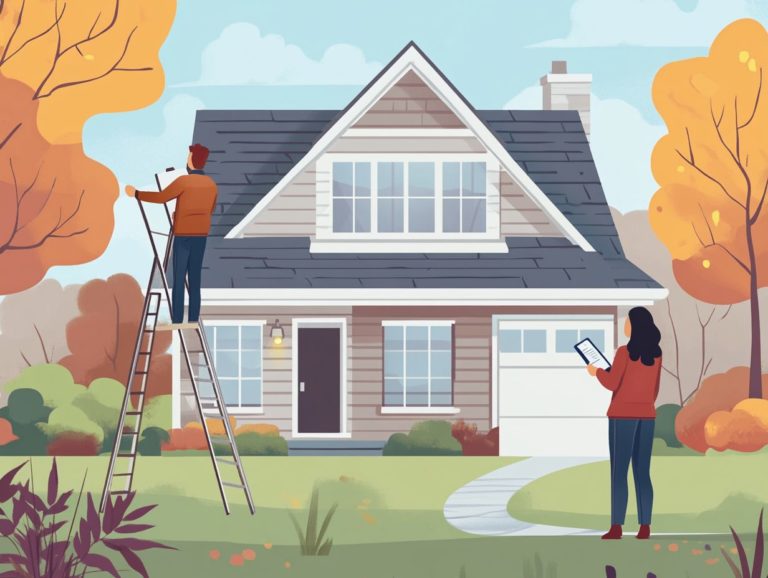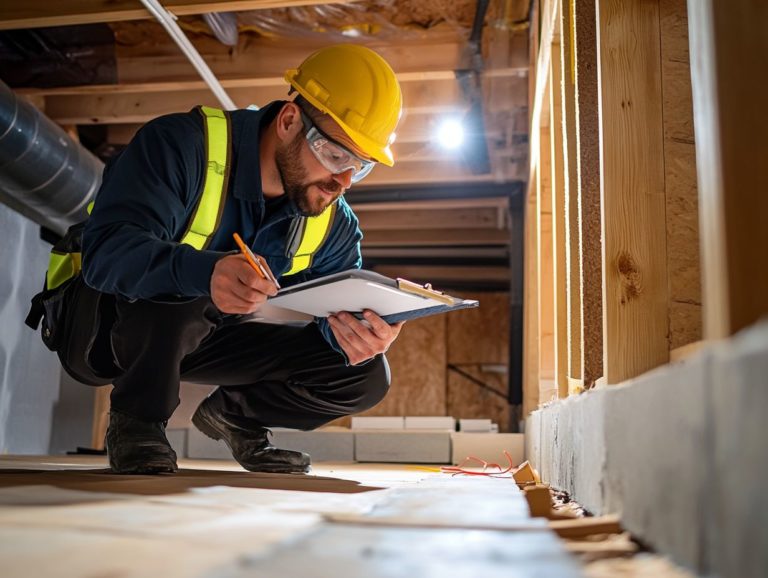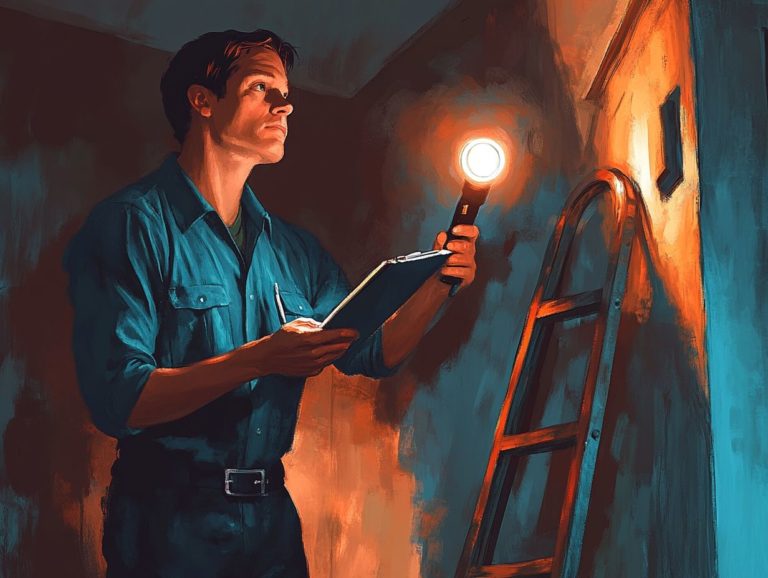The Connection Between Home Inspections and Financing
When you’re in the market for a home, grasping the importance of home inspections can truly transform your buying experience.
Home inspections uncover the property’s condition and are essential for securing financing. They can sway mortgage approvals and impact insurance coverage, making inspections pivotal players in the financial landscape of home buying.
This article will walk you through the different types of home inspections, how to prepare for them, and what to do with the results ensuring you re thoroughly equipped for a successful purchase.
Contents
- Key Takeaways:
- Importance of Home Inspections
- How Home Inspections Affect Financing
- Types of Home Inspections
- Preparing for a Home Inspection
- Addressing Inspection Findings
- Finalizing Financing After Inspection
- Preguntas Frecuentes
- Cu l es la conexi n entre las inspecciones de viviendas y el financiamiento?
- Por qu es necesaria una inspecci n de vivienda para el financiamiento?
- Qui n es responsable de pagar la inspecci n de la vivienda?
- Puede una inspecci n de vivienda afectar el financiamiento de una casa?
- Qu sucede si la inspecci n de la vivienda revela problemas importantes?
- Es una inspecci n de vivienda lo mismo que una tasaci n?
Key Takeaways:

Home inspections play a crucial role in the home buying process, providing buyers with an in-depth understanding of the property’s condition.
They can directly impact financing, influencing mortgage approval and insurance coverage.
Preparing for a home inspection and addressing any findings is essential for a successful closing, as highlighted in the impact of home inspections on closing deals and finalizing financing.
Discussing repairs and potentially adjusting the price may be necessary.
Importance of Home Inspections
Home inspections are essential for both first-time home buyers and seasoned homeowners, playing a crucial role in the real estate transaction process.
When you engage a professional inspector for a thorough home inspection, you receive a detailed report that brings to light both major and minor issues within the property.
This includes electrical and plumbing concerns, structural integrity, and heating, ventilation, and air conditioning systems.
Taking this step protects you from costly surprises later. The insights from the inspection can also influence your financial decisions, including mortgage approval, closing costs, and understanding the importance of home inspections in real estate deals to ensure you have the right protection through inspection contingencies.
How Home Inspections Affect Financing
Home inspections are crucial for financing, especially when it comes to mortgage approval.
Lenders frequently mandate these evaluations to accurately determine the property’s value and minimize the risks linked to lending.
Understanding this connection can be essential as you navigate the home-buying process.
Impact on Mortgage Approval
A home inspection plays a pivotal role in the mortgage approval process, as lenders depend on the role of home inspections in real estate transactions to assess the property’s condition and ensure it aligns with their lending criteria.
Any significant issues uncovered during the inspection, be it structural problems, plumbing deficiencies, or electrical hazards, can substantially impact your chances of securing financing, highlighting the role of home inspections in real estate.
These concerns might lead lenders to insist on extensive repairs before they will greenlight your loan, potentially causing delays in closing.
On the flip side, a well-maintained property can facilitate a smoother approval process, paving the way for a seamless transition into homeownership.
Therefore, grasping the nuances of the property s condition and proactively addressing any red flags can be invaluable not just for your peace of mind, but also for meeting the stringent requirements imposed by financial institutions.
Influence on Insurance Coverage
Home inspections have a direct impact on your insurance coverage, as insurers frequently rely on the findings from the inspection report to shape policy terms, determine premiums, and assess eligibility.
These assessments are vital because they bring to light specific safety concerns, such as electrical hazards or faulty plumbing, which can pose significant risks.
For instance, if your home has an outdated electrical system, it may not only fall short of modern safety standards but also heighten the risk of fire.
This can lead insurers to reassess their risk, sometimes resulting in higher premiums or, in some cases, even denial of coverage if serious issues come to light.
This reality highlights the necessity of thorough inspections, giving you the power to make informed financial decisions while protecting your future investments.
Types of Home Inspections

You will find that various types of home inspections address specific aspects of property evaluation.
- Mold inspections
- Pest inspections
- Roof inspections
- Thorough assessments of the heating, ventilation, and air conditioning system
- Plumbing issues
This multifaceted approach ensures that every corner of the property’s condition is comprehensively covered.
Have you considered the different types of home inspections? Make sure to schedule your home inspection as soon as you find a property.
Common Inspections and Their Purpose
Common home inspections encompass a variety of assessments, including roof inspections, HVAC system evaluations, plumbing checks, foundation assessments, pest inspections, and mold inspections. Each of these plays a distinct role in evaluating the overall condition of a property.
These inspections are essential because they provide you with detailed insights into the structural and functional aspects of a home, empowering you to make informed decisions.
For example, a roof inspection makes sure your roof is in good shape and doesn’t have any leaks, which can save you from costly repairs down the line. Similarly, HVAC assessments check how well your heating, ventilation, and air conditioning systems are working, while plumbing inspections identify leaks and blockages that could lead to significant water damage.
Foundation evaluations are crucial for understanding the stability of your home. Pest inspections help identify any infestations that could threaten the property. Mold inspections are just as important, as they can uncover hidden hazards that affect indoor air quality.
The findings from these assessments not only guide necessary repairs but also play a significant role in the negotiation process. They allow you to factor in potential costs or even request concessions from sellers, ensuring you make a well-informed investment.
Preparing for a Home Inspection
Preparing for a home inspection requires a solid grasp of the inspection process and the strategic use of a comprehensive checklist. By ensuring all critical aspects of the property are thoroughly examined, you can significantly elevate the visual analysis the inspector conducts.
This proactive approach not only streamlines the process but also enhances overall transparency and confidence in your property s condition.
Tips for a Successful Inspection
To ensure a successful home inspection, you ll want to follow some key tips. Start by creating an inspection checklist and addressing any visible issues beforehand; this sets the stage for a smoother inspection process.
It’s vital for you, as the homeowner, to be present during the inspection. This presence allows you to gain valuable insights directly from the inspector and ask questions in real-time. Engaging with the inspector not only clarifies potential concerns but also opens the door to simple fixes or maintenance suggestions.
Once the inspection wraps up, taking the time to review the findings thoroughly is essential. This step will help you understand the current state of your property and form a plan for future maintenance, ultimately preserving your home s value over time.
Addressing Inspection Findings
Addressing inspection findings is an essential step in your home buying journey. It requires deftly navigating the negotiation process to request necessary repairs and potentially renegotiate the price based on the insights revealed in the inspection report.
This proactive approach protects your investment and makes sure your new home meets your needs.
Negotiating Repairs and Renegotiating Price

Negotiating repairs and potentially revisiting the price after receiving the home inspection report is a strategic endeavor that can profoundly impact your investment and safeguard your interests.
In this context, it s crucial for you to approach the conversation with a firm grasp of the inspection findings, prioritizing repairs that are essential and non-negotiable for your safety and comfort.
When you present these concerns to the seller, do so collaboratively, highlighting a shared objective of preserving the property’s long-term value. You should also be well aware of your rights, including the ability to request repairs or a price adjustment based on significant issues uncovered during the inspection.
Understanding local regulations and protections can empower you and streamline the negotiation process, reinforcing your position while fostering a constructive dialogue.
Finalizing Financing After Inspection
Finalizing financing after a home inspection marks a pivotal moment in your home-buying journey. At this stage, it’s essential to ensure that all necessary repairs have been addressed, that you fully understand the closing costs, and that you have secured mortgage approval. Understanding the role of home inspections can greatly aid in this process.
This is where the details come together, paving the way for the exciting transition into your new home.
Next Steps for Closing the Deal
The next steps to closing the deal require you to review the inspection report carefully, make informed financial decisions, and finalize negotiations. This ensures a smooth transition into homeownership.
Take the time to assess any issues highlighted in the inspection. Consider whether repairs or credits are needed before moving forward.
Open talks with the sellers are crucial, as your goal should be to reach an agreement that satisfies both parties.
Once negotiations are complete, securing financing becomes your top priority. Work closely with your lenders to keep the loan process on track.
As you prepare for closing, pay close attention to communication and documentation. Clarity in these areas can help you avoid surprises on closing day!
Preguntas Frecuentes
Cu l es la conexi n entre las inspecciones de viviendas y el financiamiento?
La conexión entre las inspecciones de viviendas y el financiamiento es que la mayoría de los prestamistas requieren que se complete una inspección de la vivienda antes de aprobar un préstamo hipotecario. Esto asegura que la propiedad esté en buenas condiciones y que valga la cantidad que se está financiando, destacando el papel de las inspecciones de viviendas en las ventas.
Por qu es necesaria una inspecci n de vivienda para el financiamiento?
Una inspección de vivienda es necesaria para el financiamiento porque ayuda a identificar cualquier problema o defecto potencial en la propiedad. Esta información es crucial para que el prestamista determine el valor y las condiciones de la casa, y si es una buena inversión para el prestatario. Para más detalles, consulta el papel clave de las inspecciones de vivienda en bienes raíces.
Qui n es responsable de pagar la inspecci n de la vivienda?
El comprador es t picamente responsable de pagar la inspecci n de la vivienda. Sin embargo, en algunos casos, el vendedor puede cubrir el costo si se incluye en las negociaciones del contrato.
Puede una inspecci n de vivienda afectar el financiamiento de una casa?
S, una inspección de vivienda puede afectar el financiamiento de una casa si se descubren problemas significativos. El prestamista puede exigir que se realicen reparaciones antes de aprobar el préstamo o ajustar los términos del préstamo según el estado de la casa.
Qu sucede si la inspecci n de la vivienda revela problemas importantes?
Si la inspecci n de la vivienda revela problemas importantes, el comprador puede negociar con el vendedor para que los repare antes del cierre. Si el vendedor no est dispuesto a hacer las reparaciones, el comprador puede optar por retirarse de la compra o utilizar el informe de inspecci n para renegociar el precio.
Es una inspecci n de vivienda lo mismo que una tasaci n?
No, una inspecci n de vivienda no es lo mismo que una tasaci n. Una tasaci n es una valoraci n del valor de la propiedad, mientras que una inspecci n de vivienda es una evaluaci n completa del estado de la casa y de los problemas potenciales.

